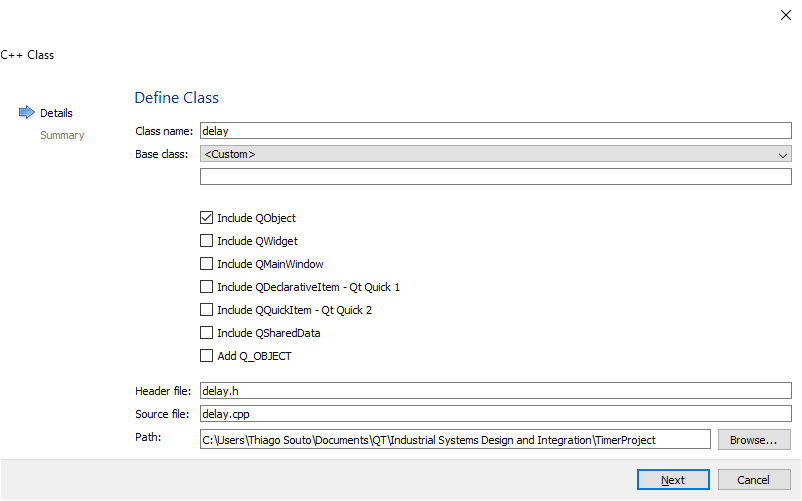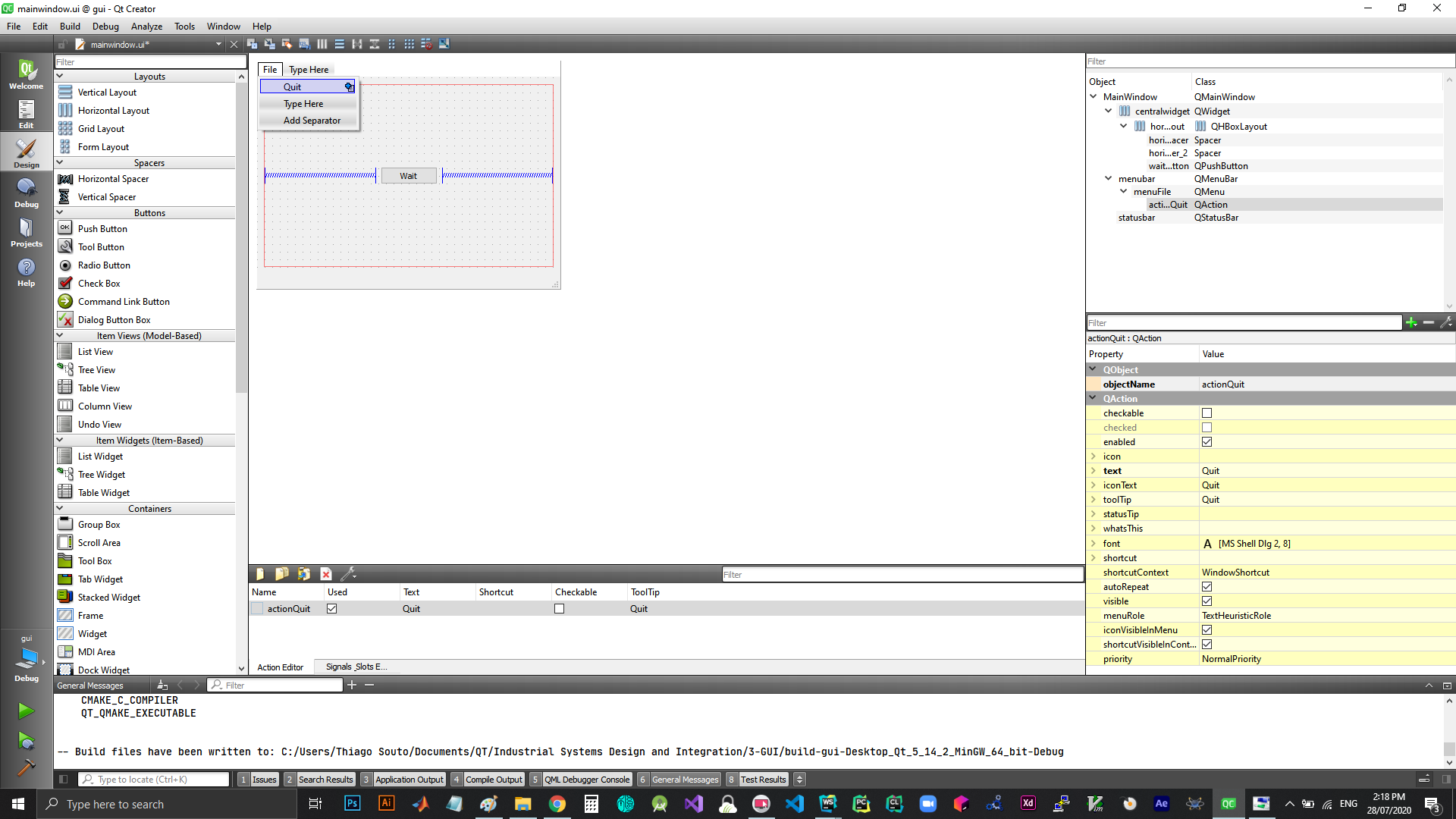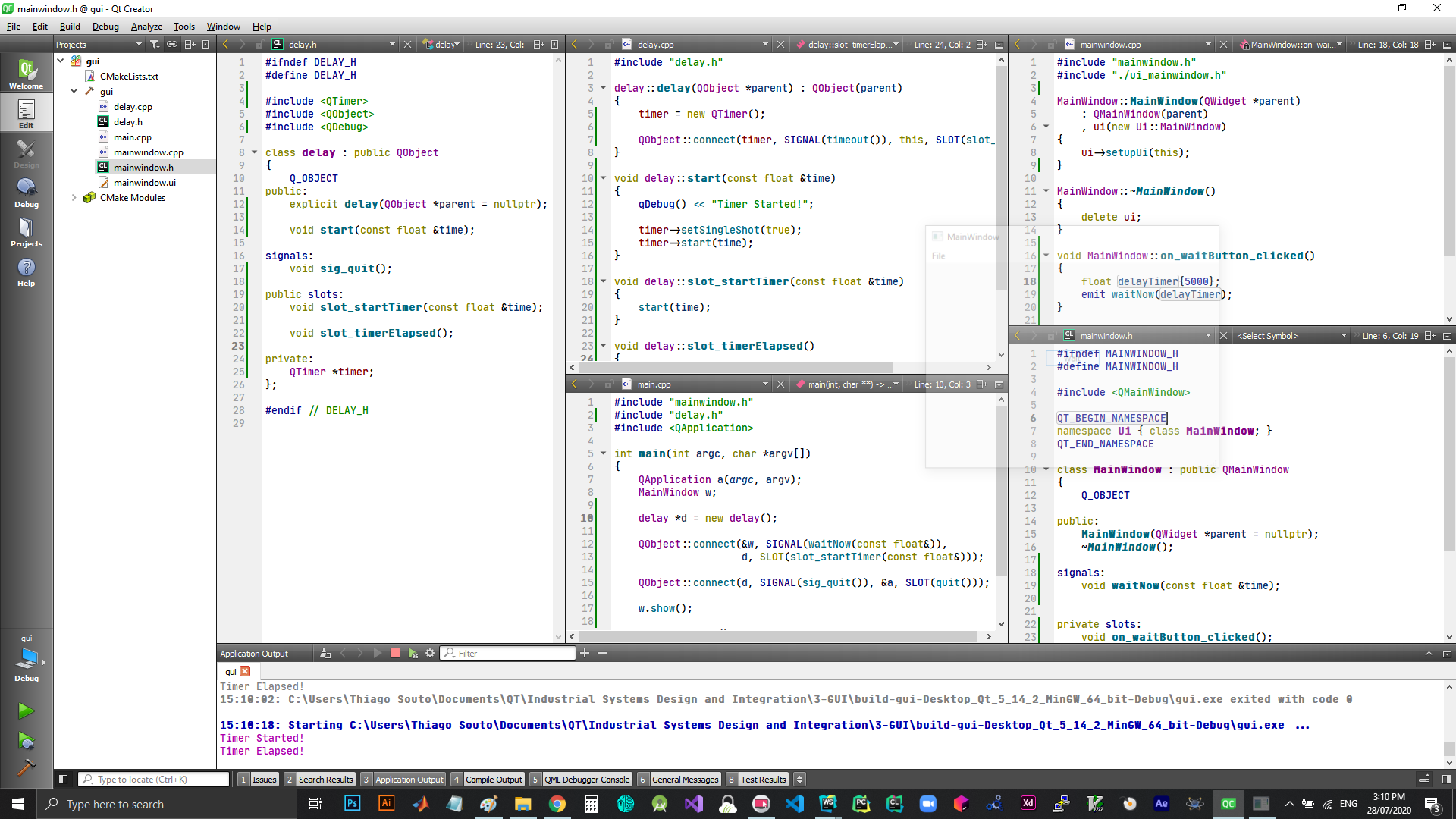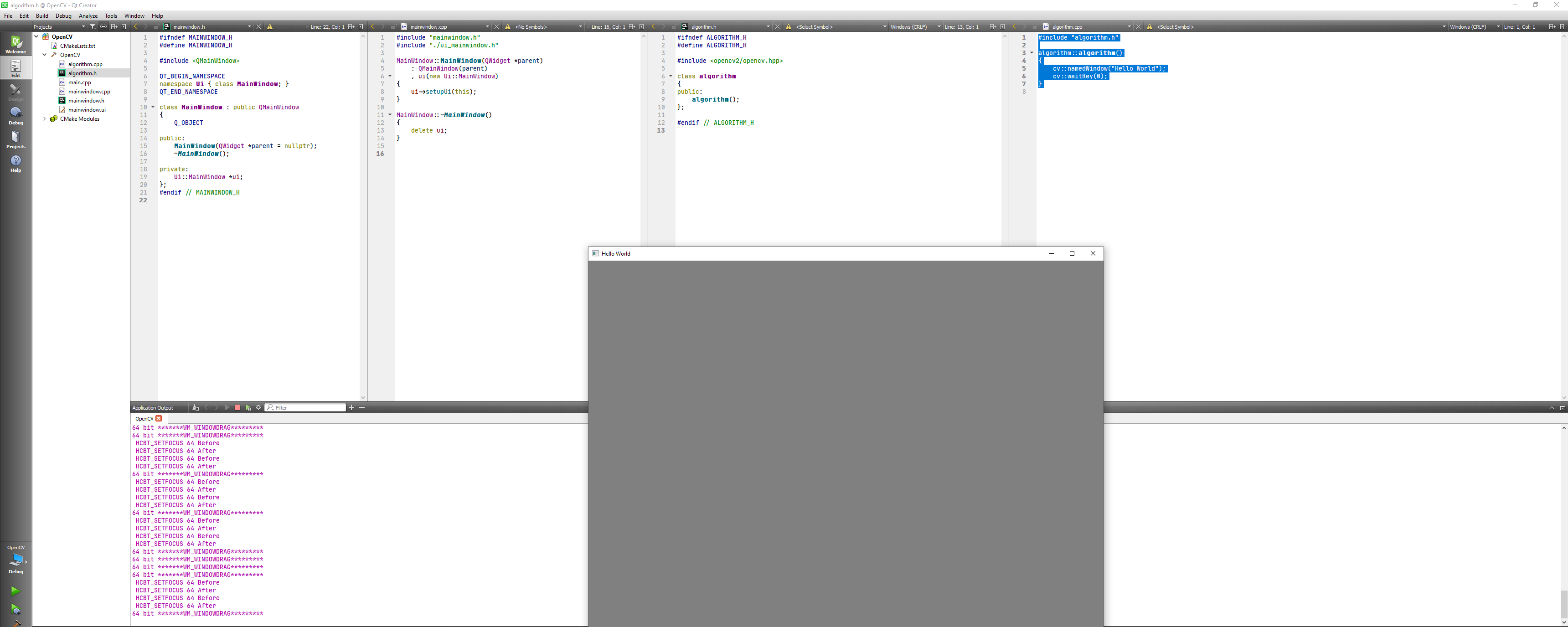# Industrial Systems Design and Integration
# First Class - 21/07/2020
Frazer will give the first two weeks of class being based on Qt and LabView.
# Timer project on Qt Console Application
First create a QT Console Application:

Then Add a class to the project

TIP
If using Cmake remember to include the class h and cpp file to the Cmake file.
delay.h
#ifndef DELAY_H
#define DELAY_H
#include <QObject>
#include <QTimer>
#include <iostream>
class delay : public QObject
{
Q_OBJECT
public:
explicit delay(QObject *parent = 0);
void start(const float &time);
public slots:
void slot_timerElapsed();
private:
QTimer *timer;
signals:
void sig_quit();
public slots:
};
#endif // DELAY_H
2
3
4
5
6
7
8
9
10
11
12
13
14
15
16
17
18
19
20
21
22
23
24
25
26
27
28
delay.cpp
#include "delay.h"
delay::delay(QObject *parent) : QObject(parent)
{
timer = new QTimer();
QObject::connect(timer, SIGNAL(timeout()), this, SLOT(slot_timerElapsed()));
}
void delay::start(const float &time)
{
std::cout << "Timer Started! " << std::endl;
timer->setSingleShot(true);
timer->start(time);
}
void delay::slot_timerElapsed()
{
std::cout << "Timer Elapsed!" << std::endl;
emit sig_quit();
}
2
3
4
5
6
7
8
9
10
11
12
13
14
15
16
17
18
19
20
21
22
main.cpp
#include <QCoreApplication>
#include <QObject>
#include "delay.h"
int main(int argc, char *argv[])
{
QCoreApplication a(argc, argv);
delay *d = new delay();
QObject::connect(d, SIGNAL(sig_quit()), &a, SLOT(quit()));
d->start(5000);
return a.exec();
}
2
3
4
5
6
7
8
9
10
11
12
13
14
15
16
17
Output:
Timer Started!
Timer Elapsed!
Press <RETURN> to close this window...
2
3
The explanation for this program is this:
Looking at the
main.cppin the main function we create anQCoreApplicationa.Then we create a
delayinstanced.dis an instance of the methoddelay.We connect the
SIGNALsig_quit()to theSLOTquit()in the program. So when the SIGNAL is sent the application quits.we start
dand pass thetimevalue of 5000msThe timer starts and
coutTimer Started, then goes on one shot until the time is out.Because the delay method of the delay function links the timeout of the timer to the function
slot_timerElapsed(), When the time is out theslot_timerElapsed()is trigged.the
slot_timerElapsed()functioncoutTimer Elapsed and emit theSIGNALsig_quit()the
sig_quit()SIGNAL triggers the SLOTquit()and the applicationacloses.
# Class 2 - 23/07/2020
TIP
Pay attention to data type when connecting slots in Qt
# Serial Communication
Now we are going to make a program that sends data to the serial port in the arduino:
main.cpp
#include <QCoreApplication>
#include <serial.h>
int main(int argc, char *argv[])
{
QCoreApplication a(argc, argv);
Serial *s = new Serial();
QObject::connect(s, SIGNAL(sig_quit()), &a, SLOT(quit()));
s->open("COM6");
s->write("Hello world!");
return a.exec();
}
2
3
4
5
6
7
8
9
10
11
12
13
14
15
16
17
18
TIP
On the CMakeLists file we have to include the find_package(Qt5SerialPort) and target_link_libraries(Serial_PROJECT Qt5::SerialPort)
CMake file
cmake_minimum_required(VERSION 3.5)
project(Serial_PROJECT LANGUAGES CXX)
set(CMAKE_INCLUDE_CURRENT_DIR ON)
set(CMAKE_AUTOUIC ON)
set(CMAKE_AUTOMOC ON)
set(CMAKE_AUTORCC ON)
set(CMAKE_CXX_STANDARD 17)
set(CMAKE_CXX_STANDARD_REQUIRED ON)
find_package(Qt5Core)
find_package(Qt5SerialPort)
add_executable(Serial_PROJECT
main.cpp
serial.h
serial.cpp
)
target_link_libraries(Serial_PROJECT Qt5::Core)
target_link_libraries(Serial_PROJECT Qt5::SerialPort)
2
3
4
5
6
7
8
9
10
11
12
13
14
15
16
17
18
19
20
21
22
23
serial.h
#ifndef SERIAL_H
#define SERIAL_H
#include <QObject>
#include <QtSerialPort>
#include <iostream>
class Serial : public QObject
{
Q_OBJECT
public:
explicit Serial(QObject *parent = nullptr);
void open(const QString &name);
void write(const QString &message);
signals:
void sig_quit();
private slots:
void slot_messageWritten();
private:
QSerialPort *serialPort;
};
#endif // SERIAL_H
2
3
4
5
6
7
8
9
10
11
12
13
14
15
16
17
18
19
20
21
22
23
24
25
26
27
28
29
30
31
serial.cpp
TIP
qint64
#include "serial.h"
Serial::Serial(QObject *parent) : QObject(parent)
{
serialPort = new QSerialPort();
QObject::connect(serialPort, SIGNAL(bytesWritten(qint64)), this, SLOT(slot_messageWritten()));
}
void Serial::open(const QString &name)
{
serialPort->setPortName(name);
serialPort->setBaudRate(115200);
serialPort->setDataBits(QSerialPort::Data8);
serialPort->setParity(QSerialPort::NoParity);
serialPort->setStopBits(QSerialPort::OneStop);
if(!serialPort->isOpen())
{
serialPort->close();
}
std::cout << "Serial Port " << name.toStdString() << "opened!" << std::endl;
serialPort->open(QIODevice::ReadWrite);
}
void Serial::write(const QString &message)
{
std::cout << "Message: " << message.toStdString() << std::endl;
int bytesWritten = serialPort->write(message.toUtf8());
std::cout << "Bytes written: " << bytesWritten << std::endl;
}
void Serial::slot_messageWritten()
{
std::cout << "Serial Port closed!" << std::endl;
serialPort->close();
emit sig_quit();
}
2
3
4
5
6
7
8
9
10
11
12
13
14
15
16
17
18
19
20
21
22
23
24
25
26
27
28
29
30
31
32
33
34
35
36
37
38
39
40
41
42
43
44
# Server
main.cpp
#include <QCoreApplication>
#include <server.h>
int main(int argc, char *argv[])
{
QCoreApplication a(argc, argv);
Server *s = new Server();
QObject::connect(s, SIGNAL(sig_quit()),
&a, SLOT(quit()));
return a.exec();
}
2
3
4
5
6
7
8
9
10
11
12
13
14
CMake
cmake_minimum_required(VERSION 3.5)
project(Server LANGUAGES CXX)
set(CMAKE_INCLUDE_CURRENT_DIR ON)
set(CMAKE_AUTOUIC ON)
set(CMAKE_AUTOMOC ON)
set(CMAKE_AUTORCC ON)
set(CMAKE_CXX_STANDARD 11)
set(CMAKE_CXX_STANDARD_REQUIRED ON)
find_package(Qt5Core)
find_package(Qt5Network)
add_executable(Server
main.cpp
server.h
server.cpp
)
target_link_libraries(Server Qt5::Core)
target_link_libraries(Server Qt5::Network)
2
3
4
5
6
7
8
9
10
11
12
13
14
15
16
17
18
19
20
21
22
23
server.h
#ifndef SERVER_H
#define SERVER_H
#include <QObject>
#include <QTcpServer>
#include <QTcpSocket>
#include <iostream>
class Server : public QObject
{
Q_OBJECT
public:
explicit Server(QObject *parent = nullptr);
signals:
void sig_quit();
public slots:
void slot_acceptConnection();
void slot_readMessage();
private:
QTcpServer *messageServer;
QTcpSocket *socket;
};
#endif // SERVER_H
2
3
4
5
6
7
8
9
10
11
12
13
14
15
16
17
18
19
20
21
22
23
24
25
26
27
28
29
server.cpp
#include "server.h"
Server::Server(QObject *parent) : QObject(parent)
{
messageServer = new QTcpServer();
socket = new QTcpSocket();
QObject::connect(messageServer, SIGNAL(newConnection()),
this, SLOT(slot_acceptConnection()));
messageServer->listen(QHostAddress("127.0.0.1"), 9601);
}
void Server::slot_acceptConnection()
{
socket = messageServer->nextPendingConnection();
QObject::connect(socket, SIGNAL(readyRead()),
this, SLOT(slot_readMessage()));
}
void Server::slot_readMessage()
{
QByteArray buffer;
buffer = socket->readAll();
int bytesRead = buffer.length();
std::cout << "Message: " << buffer.toStdString() << std::endl;
std::cout << "Bytes read: " << bytesRead << std::endl;
messageServer->close();
emit sig_quit();
}
2
3
4
5
6
7
8
9
10
11
12
13
14
15
16
17
18
19
20
21
22
23
24
25
26
27
28
29
30
31
32
33
34
35
36
37
# Client
main.cpp
#include <QCoreApplication>
#include "client.h"
int main(int argc, char *argv[])
{
QCoreApplication a(argc, argv);
client *c = new client();
QObject::connect(c, SIGNAL(sig_quit()),
&a, SLOT(quit()));
c->open("127.0.0.1", 9601);
c->write("Hello World");
return a.exec();
}
2
3
4
5
6
7
8
9
10
11
12
13
14
15
16
17
18
19
Cmake
cmake_minimum_required(VERSION 3.5)
project(client LANGUAGES CXX)
set(CMAKE_INCLUDE_CURRENT_DIR ON)
set(CMAKE_AUTOUIC ON)
set(CMAKE_AUTOMOC ON)
set(CMAKE_AUTORCC ON)
set(CMAKE_CXX_STANDARD 11)
set(CMAKE_CXX_STANDARD_REQUIRED ON)
find_package(Qt5Core)
find_package(Qt5Network)
add_executable(client
main.cpp
client.h
client.cpp
)
target_link_libraries(client Qt5::Core)
target_link_libraries(client Qt5::Network)
2
3
4
5
6
7
8
9
10
11
12
13
14
15
16
17
18
19
20
21
22
23
client.h
#ifndef CLIENT_H
#define CLIENT_H
#include <QObject>
#include <QTcpSocket>
#include <iostream>
class client : public QObject
{
Q_OBJECT
public:
explicit client(QObject *parent = nullptr);
void open(const QString &ipAdress, const int &port);
void write(const QString &message);
signals:
void sig_quit();
private slots:
void slot_onConnection();
void slot_messageWritten();
private:
QTcpSocket * socket;
};
#endif // CLIENT_H
2
3
4
5
6
7
8
9
10
11
12
13
14
15
16
17
18
19
20
21
22
23
24
25
26
27
28
client.cpp
#include "client.h"
client::client(QObject *parent) : QObject(parent)
{
socket = new QTcpSocket();
QObject::connect(socket, SIGNAL(connected()),
this, SLOT(slot_onConnection()));
QObject::connect(socket, SIGNAL(bytesWritten(qint64)),
this, SLOT(slot_messageWritten()));
}
void client::open(const QString &ipAdress, const int &port)
{
socket->connectToHost(ipAdress, port);
}
void client::write(const QString &message)
{
std::cout << "Message: " << message.toStdString() << std::endl;
int bytesWritten = socket->write(message.toUtf8());
std::cout << "Bytes written: " << bytesWritten << std::endl;
}
void client::slot_onConnection()
{
std::cout << "Connected to host" << std::endl;
}
void client::slot_messageWritten()
{
socket->close();
emit sig_quit();
}
2
3
4
5
6
7
8
9
10
11
12
13
14
15
16
17
18
19
20
21
22
23
24
25
26
27
28
29
30
31
32
33
34
35
36
37
38
# Interaction between Server and Client
Server:
Message: Hello World
Bytes read: 11
2
Client:
Message: Hello World
Bytes written: 11
Connected to host
2
3
# Class 3 - 28/07/2020
# Simple UI with timer control
First let's build a simple ui

Then it will delay for 5 seconds before close the application
main.cpp
#include "mainwindow.h"
#include "delay.h"
#include <QApplication>
int main(int argc, char *argv[])
{
QApplication a(argc, argv);
MainWindow w;
delay *d = new delay();
QObject::connect(&w, SIGNAL(waitNow(const float&)),
d, SLOT(slot_startTimer(const float&)));
QObject::connect(d, SIGNAL(sig_quit()), &a, SLOT(quit()));
w.show();
return a.exec();
}
2
3
4
5
6
7
8
9
10
11
12
13
14
15
16
17
18
19
20
delay.h
#ifndef DELAY_H
#define DELAY_H
#include <QTimer>
#include <QObject>
#include <QDebug>
class delay : public QObject
{
Q_OBJECT
public:
explicit delay(QObject *parent = nullptr);
void start(const float &time);
signals:
void sig_quit();
public slots:
void slot_startTimer(const float &time);
void slot_timerElapsed();
private:
QTimer *timer;
};
#endif // DELAY_H
2
3
4
5
6
7
8
9
10
11
12
13
14
15
16
17
18
19
20
21
22
23
24
25
26
27
28
delay.cpp
#include "delay.h"
delay::delay(QObject *parent) : QObject(parent)
{
timer = new QTimer();
QObject::connect(timer, SIGNAL(timeout()), this, SLOT(slot_timerElapsed()));
}
void delay::start(const float &time)
{
qDebug() << "Timer Started!";
timer->setSingleShot(true);
timer->start(time);
}
void delay::slot_startTimer(const float &time)
{
start(time);
}
void delay::slot_timerElapsed()
{
qDebug() << "Timer Elapsed!";
emit sig_quit();
}
2
3
4
5
6
7
8
9
10
11
12
13
14
15
16
17
18
19
20
21
22
23
24
25
26
27
28
mainwindow.h
#ifndef MAINWINDOW_H
#define MAINWINDOW_H
#include <QMainWindow>
QT_BEGIN_NAMESPACE
namespace Ui { class MainWindow; }
QT_END_NAMESPACE
class MainWindow : public QMainWindow
{
Q_OBJECT
public:
MainWindow(QWidget *parent = nullptr);
~MainWindow();
signals:
void waitNow(const float &time);
private slots:
void on_waitButton_clicked();
void on_actionQuit_triggered();
private:
Ui::MainWindow *ui;
};
#endif // MAINWINDOW_H
2
3
4
5
6
7
8
9
10
11
12
13
14
15
16
17
18
19
20
21
22
23
24
25
26
27
28
29
30
mainwindow.cpp
#include "mainwindow.h"
#include "./ui_mainwindow.h"
MainWindow::MainWindow(QWidget *parent)
: QMainWindow(parent)
, ui(new Ui::MainWindow)
{
ui->setupUi(this);
}
MainWindow::~MainWindow()
{
delete ui;
}
void MainWindow::on_waitButton_clicked()
{
float delayTimer{5000};
emit waitNow(delayTimer);
}
void MainWindow::on_actionQuit_triggered()
{
QApplication::quit();
}
2
3
4
5
6
7
8
9
10
11
12
13
14
15
16
17
18
19
20
21
22
23
24
25

# OpenCV Example
The Cmake file. It's important to use a MSVC kit to build, because the OpenCV library built was built with MSVC. To use the MingW we have to compile Opencv with MingW from the github source.
CMakeLists.txt
cmake_minimum_required(VERSION 3.5)
project(OpenCV LANGUAGES CXX)
set(CMAKE_INCLUDE_CURRENT_DIR ON)
set(CMAKE_AUTOUIC ON)
set(CMAKE_AUTOMOC ON)
set(CMAKE_AUTORCC ON)
set(CMAKE_CXX_STANDARD 17)
set(CMAKE_CXX_STANDARD_REQUIRED ON)
# QtCreator supports the following variables for Android, which are identical to qmake Android variables.
# Check http://doc.qt.io/qt-5/deployment-android.html for more information.
# They need to be set before the find_package(Qt5 ...) call.
#if(ANDROID)
# set(ANDROID_PACKAGE_SOURCE_DIR "${CMAKE_CURRENT_SOURCE_DIR}/android")
# if (ANDROID_ABI STREQUAL "armeabi-v7a")
# set(ANDROID_EXTRA_LIBS
# ${CMAKE_CURRENT_SOURCE_DIR}/path/to/libcrypto.so
# ${CMAKE_CURRENT_SOURCE_DIR}/path/to/libssl.so)
# endif()
#endif()
find_package(Qt5 COMPONENTS Widgets REQUIRED)
SET("OpenCV_DIR" "C:/opencv")
find_package(OpenCV REQUIRED)
if(ANDROID)
add_library(OpenCV SHARED
main.cpp
mainwindow.cpp
mainwindow.h
mainwindow.ui
algorithm.cpp
algorithm.h
)
else()
add_executable(OpenCV
main.cpp
mainwindow.cpp
mainwindow.h
mainwindow.ui
algorithm.cpp
algorithm.h
)
endif()
target_link_libraries(OpenCV PRIVATE Qt5::Widgets ${OpenCV_LIBS})
2
3
4
5
6
7
8
9
10
11
12
13
14
15
16
17
18
19
20
21
22
23
24
25
26
27
28
29
30
31
32
33
34
35
36
37
38
39
40
41
42
43
44
45
46
47
48
49
50
51
52
For this project we are going to create a simple class that will call for an algorithm() function. This function will create a namedWindow with a "Hello World" title and wait to be closed.
algorithm.h
#ifndef ALGORITHM_H
#define ALGORITHM_H
#include <opencv2/opencv.hpp>
class algorithm
{
public:
algorithm();
};
#endif // ALGORITHM_H
2
3
4
5
6
7
8
9
10
11
12
algorithm.cpp
#include "algorithm.h"
algorithm::algorithm()
{
cv::namedWindow("Hello World");
cv::waitKey(0);
}
2
3
4
5
6
7
The main window will be there with no function, just the normal project created by Qt.
